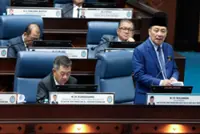Future-proofing: A generation skilled in STEM, AI and TVET is well-positioned to find high-quality employment. – Filepic
THE Budget 2024 allocation for science, technology, engineering and mathematics (STEM), artificial intelligence (AI), and technical and vocational education and training (TVET), can significantly enhance the quality of education in schools and universities.
During the tabling of the budget on Oct 13, Prime Minister Datuk Seri Anwar Ibrahim announced the allocation of RM100mil for STEM education, RM20mil for AI and RM6.8bil for TVET.





